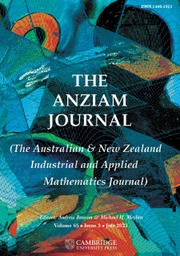Article contents
Subsonic potential flow past a circle and the transonic controversy
Published online by Cambridge University Press: 17 February 2009
Abstract
The Mach-number series expansion of the potential function for the two-dimensional flow of an inviscid, compressible, perfect, diatomic gas past a circular cylinder is obtained to 29 terms. Analysis of this expansion allows the critical Mach number, at which flow first becomes locally sonic, to be estimated as M* = 0.39823780 ± 0.00000001. Analysis also permits the following estimate of the radius of convergence of the series for the maximum velocity to be made: Mc = 0.402667605 ± 0.00000005, though we have been unable to determine the nature of the singularity of M = Mc. Since Mc exceeds M* by some 1.1%, it follows that this particular “airfoil” can possess a continuous range of shock-free potential flows above the critical Mach number. This result hopefully resolves a 70-year old controversy.
Information
- Type
- Research Article
- Information
- Copyright
- Copyright © Australian Mathematical Society 1983
References
- 10
- Cited by

